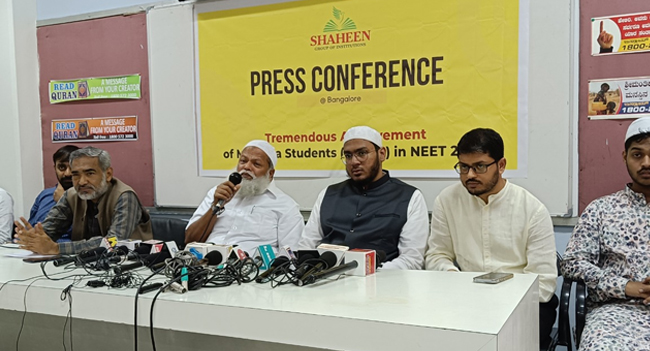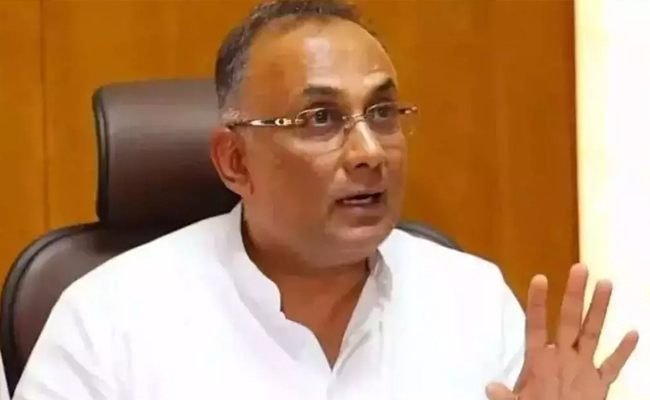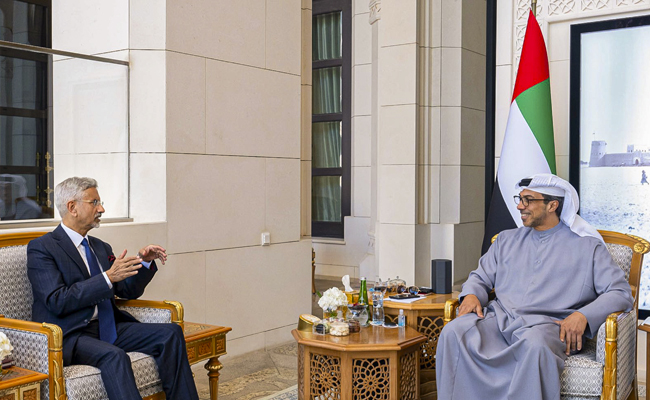Bengaluru: Dr. Abdul Qadeer, chairman of the Shaheen Group of Institutions, Bidar, has expressed pride in the excellent performance of the Hifzul Quran course students at the Shaheen College in the NEET 2022.
Dr. Abdul Qadeer said that 12 students who had completed the Hifzul Quran Plus course at the Madrasa have gotten ranks in NEET and expect to be selected for the MBBS course in government medical colleges.
He was addressing a press meet at the Darussalam Hall of the Bangalore Islamic Foundation Trust, Queen’s Road, on Tuesday.
“The 'Academic Intensive Care Unit (AICU)' of the Shaheen Group provides a three-month foundation course of Mathematics and Language for students who have completed the Hifzul course through Madrasa education, without attending school, and for school dropouts. After this, a one-month bridge course is conducted in Science for the students to get admitted to Class 10. Next comes a year-long education with state syllabus or NIOC syllabus for the Madrasa-educated students to answer the Class 10 examinations. The intermediate course for two years, after this, prepares students for examinations like JEE, UPSC and NEET,” said the chairman.
He added that the Shaheen Group has been working for 12 years at getting Madrasa-educated students into the education mainstream. “With a view to ensure that all gates of education and career, including IAS, IPS, MBBS and Engineering, are opened for the Madrasa students and not restrict them to the religious field, we have started 35 AICU centres all over India. For the benefit of the Hafiz near Bengaluru, an AICU was started last year in Bannikuppe. More such centres will be opened at Darul Umar in Srirangapatna and Kanakapura. The Hafizes who have scored more than 350 marks in the NEET 2022 will be trained for free in our 12 residential complexes.”
Dr. Qadeer also said that, of the 1,800 Shaheen Group students who answered NEET this year, 450 students are expected to get free medical education seats, adding, “Of the government seats, students of our institutions expect to get 14 per cent.”
Hafiz Muhammad Ali Iqbal, who scored 680 in NEET, said that the four-year-long Hifzul course had helped him a lot. “I had quit my schooling to become a Hafiz. Studying with the Shaheen Group helped me score 68 in SSLC and 96 per cent in PU examinations,” he said and stated that he wished to become a doctor.
Jamia Ulum Shaheen Hifz Plus Academy director Syed Tanveer Ahmed, Falcon Shaheen Education Institutions director Abdul Subhan and the Madrasa students who had topped NEET were among those who attended the press meet.
Madrasa Students among NEET toppers (with marks)
Hafiz Muhammad Ali Iqbal: 680
Hafiz Gulman Ahmad Zerdi: 646
Hafiz Mohammad Abdulla: 632
Hafiz Huzaifa: 602
Hafiz Muhammed Saifullah 577
Hafiz Sheikh Abdul Rafi: 567
Hafiz Mohammed Faiz Akeel Ahmad: 562
Hafiz Ghulam Waris: 560
Hafiz Mohammad Suhaib Sajid Hussain: 533
Hafiz Mohammad Asif: 504
Hafiz Muhammad Ishaq: 489
Hafiz Moumin Abdulla 484
Further information may be obtained from the Shaheen Group website https://shaheengroup.org/. Toll-free number 1800-121-6235 may also be contacted.
Let the Truth be known. If you read VB and like VB, please be a VB Supporter and Help us deliver the Truth to one and all.
New Delhi: A bill to set up a 13-member body to regulate institutions of higher education was introduced in the Lok Sabha on Monday.
Union Education Minister Dharmendra Pradhan introduced the Viksit Bharat Shiksha Adhishthan Bill, which seeks to establish an overarching higher education commission along with three councils for regulation, accreditation, and ensuring academic standards for universities and higher education institutions in India.
Meanwhile, the move drew strong opposition, with members warning that it could weaken institutional autonomy and result in excessive centralisation of higher education in India.
The Viksit Bharat Shiksha Adhishthan Bill, 2025, earlier known as the Higher Education Council of India (HECI) Bill, has been introduced in line with the National Education Policy (NEP) 2020.
The proposed legislation seeks to merge three existing regulatory bodies, the University Grants Commission (UGC), the All India Council for Technical Education (AICTE), and the National Council for Teacher Education (NCTE), into a single unified body called the Viksit Bharat Shiksha Adhishthan.
At present, the UGC regulates non-technical higher education institutions, the AICTE oversees technical education, and the NCTE governs teacher education in India.
Under the proposed framework, the new commission will function through three separate councils responsible for regulation, accreditation, and the maintenance of academic standards across universities and higher education institutions in the country.
According to the Bill, the present challenges faced by higher educational institutions due to the multiplicity of regulators having non-harmonised regulatory approval protocols will be done away with.
The higher education commission, which will be headed by a chairperson appointed by the President of India, will cover all central universities and colleges under it, institutes of national importance functioning under the administrative purview of the Ministry of Education, including IITs, NITs, IISc, IISERs, IIMs, and IIITs.
At present, IITs and IIMs are not regulated by the University Grants Commission (UGC).
Government to refer bill to JPC; Oppn slams it
The government has expressed its willingness to refer it to a joint committee after several members of the Lok Sabha expressed strong opposition to the Bill, stating that they were not given time to study its provisions.
Responding to the opposition, Parliamentary Affairs Minister Kiren Rijiju said the government intends to refer the Bill to a Joint Parliamentary Committee (JPC) for detailed examination.
Congress Lok Sabha MP Manish Tewari warned that the Bill could result in “excessive centralisation” of higher education. He argued that the proposed law violates the constitutional division of legislative powers between the Union and the states.
According to him, the Bill goes beyond setting academic standards and intrudes into areas such as administration, affiliation, and the establishment and closure of university campuses. These matters, he said, fall under Entry 25 of the Concurrent List and Entry 32 of the State List, which cover the incorporation and regulation of state universities.
Tewari further stated that the Bill suffers from “excessive delegation of legislative power” to the proposed commission. He pointed out that crucial aspects such as accreditation frameworks, degree-granting powers, penalties, institutional autonomy, and even the supersession of institutions are left to be decided through rules, regulations, and executive directions. He argued that this amounts to a violation of established constitutional principles governing delegated legislation.
Under the Bill, the regulatory council will have the power to impose heavy penalties on higher education institutions for violating provisions of the Act or related rules. Penalties range from ₹10 lakh to ₹75 lakh for repeated violations, while establishing an institution without approval from the commission or the state government could attract a fine of up to ₹2 crore.
Concerns were also raised by members from southern states over the Hindi nomenclature of the Bill. N.K. Premachandran, an MP from the Revolutionary Socialist Party representing Kollam in Kerala, said even the name of the Bill was difficult to pronounce.
He pointed out that under Article 348 of the Constitution, the text of any Bill introduced in Parliament must be in English unless Parliament decides otherwise.
DMK MP T.M. Selvaganapathy also criticised the government for naming laws and schemes only in Hindi. He said the Constitution clearly mandates that the nomenclature of a Bill should be in English so that citizens across the country can understand its intent.
Congress MP S. Jothimani from Tamil Nadu’s Karur constituency described the Bill as another attempt to impose Hindi and termed it “an attack on federalism.”



_vb_22.jpeg)

